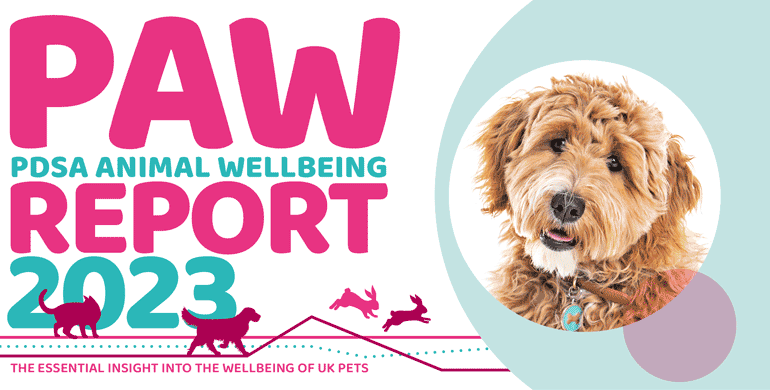Concluding thoughts from our Director of Veterinary Services, Richard Hooker
The PAW Report continues to provide high quality, reliable evidence on how well the UK’s pet dogs, cats and rabbits are having their 5 Welfare Needs met. We know how much owners care for their pets - 94% of owners say their pet makes them happy and 90% say owning a pet improves their life. But the findings also show that this love for pets may not always translate into the best care for them.


Concerns raised in this year’s Report include rabbits living without the companionship of their own species or in poor environments, cats living with inadequate resources, and dogs struggling with behavioural issues, some of which may have been exacerbated by their early experiences.
As shown in the Report, as a profession we continue to see the negative welfare impacts from pets being bred for specific looks and exaggerated conformation. 39% of veterinary professionals selected exaggerated conformation in pedigree breeds as the top issue they would choose to resolve tomorrow, and 41% selected it as the top issue they believe will have the biggest health and welfare impact in 10 years’ time. Couple this with the ongoing demand for dogs with cropped ears, and it seems that too many people are choosing their pet’s appearance over their health and wellbeing.
In the majority of cases, owners want to provide the best care for their pets - 94% told us they see pets as part of their families. So what can be done to help improve the wellbeing of the pets we share our lives with?
Effective change can be brought about through evidence-based interventions based on the human-behaviour change theory43. Findings from 13 years of the PAW Report can contribute to this process by highlighting and tracking changes in the issues raised, reporting on owners’ levels of knowledge and awareness, and through findings about the underlying reasons behind why owners do or don’t undertake certain actions associated with their pets.
It is clear from the Report that owner education needs to start before the pet comes into their homes. Owners need support to understand the commitment of owning a pet, how to source their pet responsibly, and how to ensure they are able to provide for their needs throughout their lifetime.

Legislation, including the Animal Welfare (Licensing of Activities Involving Animals) (England) Regulations 2018, has been introduced to improve the protection of both pets and owners from fraudsters and low welfare breeders. However, the Report shows that awareness amongst owners of these regulations remains low, and further guidelines produced by animal welfare organisations are also not widely recognised. The legal regulations are due to be reviewed across the devolved nations in 2023, and PAW Report data continues to be invaluable to evidence where updates are needed, including the addition of further sectors such as canine fertility clinics.
Legislation is only one part of the process to change behaviour – communication and education is needed as well. It is important that owners understand the potential implication of issues such as the importation of dogs or the use of fertility clinics and understand their responsibilities to the animals in their care. Collaborative work between animal welfare organisations is essential to raise awareness, and we know it can make a difference. Monitoring of trends with PAW Report data allows us to see changes over time – on rabbit diets and dog and cat microchipping, for example.
Alongside a lack of knowledge of the welfare needs of their pets, it seems that owners may not always be prepared for the financial commitment of pet ownership. 60% of owners underestimate the minimum monthly cost of owning their pet, and 33% of pet owners told us that owning a pet is more expensive than they expected. In the current economic climate, awareness of potential costs before committing to pet ownership is essential to reduce the risk of owners having to rehome their pets if unable to afford their ongoing care.
Pets remain such an important part of their owners’ lives, alleviating stress and improving mental wellbeing. In times of financial hardship and crisis, for over 100 years, PDSA has been there for millions of pet owners who had nowhere else to turn. As we look to the future, we will continue to strive for a lifetime of wellbeing for every pet. The insights provided by this year’s PAW Report help guide planning for the future and allow us to monitor which interventions are most effective and we will continue to work collaboratively to tackle the issues raised in the PAW Report.


Richard Hooker BVMS (Hons), MRCVS,
PDSA Director of Veterinary Services

Get in contact with the team
To contact the team, please email paw@pdsa.org.uk


